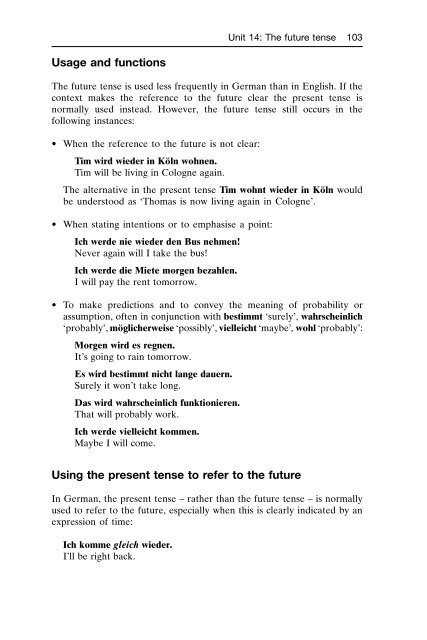Intermediate german
Create successful ePaper yourself
Turn your PDF publications into a flip-book with our unique Google optimized e-Paper software.
Unit 14: The future tense 103<br />
111<br />
2<br />
3<br />
4<br />
5<br />
6<br />
7<br />
8<br />
9<br />
1011<br />
1<br />
2<br />
13<br />
4111<br />
5<br />
6<br />
7<br />
8<br />
9<br />
2011<br />
1<br />
2<br />
3<br />
4<br />
5<br />
6<br />
7<br />
8<br />
9<br />
3011<br />
1<br />
2<br />
3<br />
4<br />
5<br />
6<br />
7<br />
8<br />
9<br />
4011<br />
1<br />
2<br />
3<br />
41111<br />
Usage and functions<br />
The future tense is used less frequently in German than in English. If the<br />
context makes the reference to the future clear the present tense is<br />
normally used instead. However, the future tense still occurs in the<br />
following instances:<br />
• When the reference to the future is not clear:<br />
Tim wird wieder in Köln wohnen.<br />
Tim will be living in Cologne again.<br />
The alternative in the present tense Tim wohnt wieder in Köln would<br />
be understood as ‘Thomas is now living again in Cologne’.<br />
• When stating intentions or to emphasise a point:<br />
Ich werde nie wieder den Bus nehmen!<br />
Never again will I take the bus!<br />
Ich werde die Miete morgen bezahlen.<br />
I will pay the rent tomorrow.<br />
• To make predictions and to convey the meaning of probability or<br />
assumption, often in conjunction with bestimmt ‘surely’, wahrscheinlich<br />
‘probably’, möglicherweise ‘possibly’, vielleicht ‘maybe’, wohl ‘probably’:<br />
Morgen wird es regnen.<br />
It’s going to rain tomorrow.<br />
Es wird bestimmt nicht lange dauern.<br />
Surely it won’t take long.<br />
Das wird wahrscheinlich funktionieren.<br />
That will probably work.<br />
Ich werde vielleicht kommen.<br />
Maybe I will come.<br />
Using the present tense to refer to the future<br />
In German, the present tense – rather than the future tense – is normally<br />
used to refer to the future, especially when this is clearly indicated by an<br />
expression of time:<br />
Ich komme gleich wieder.<br />
I’ll be right back.



